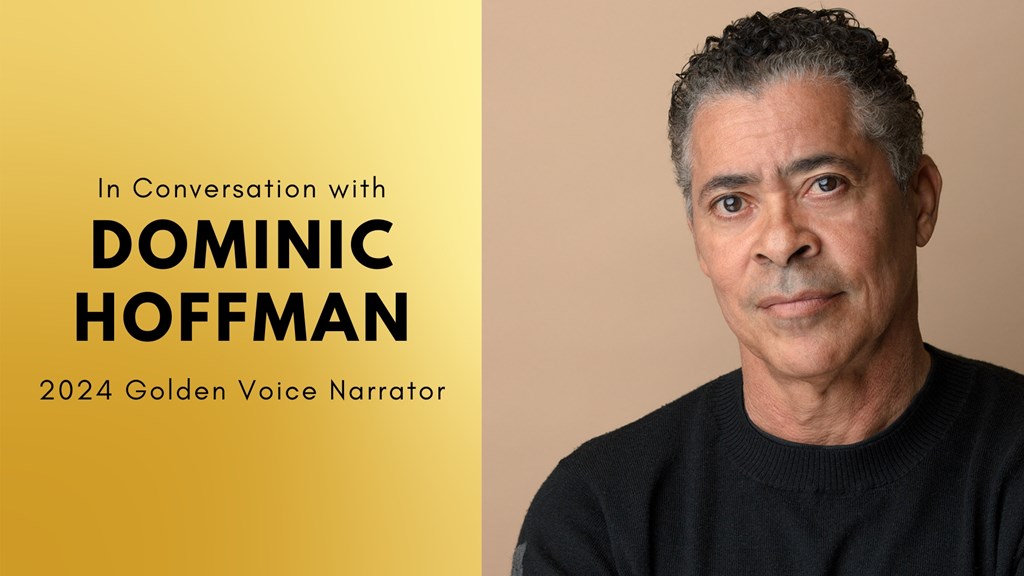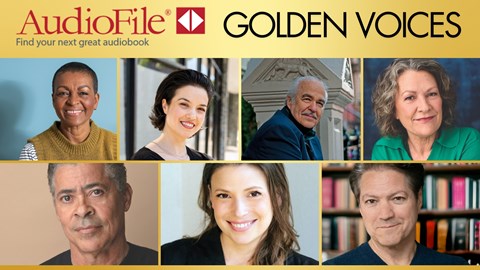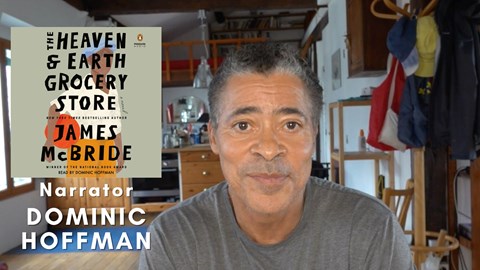AudioFile is thrilled to celebrate Dominic Hoffman as one of our 2024 Golden Voice narrators. Behind the Mic host Jo Reed spoke with Dominic about his multifaceted journey through the performing arts that led to his career in audiobook narration and becoming one of the most distinguished voices in the industry. Dominic explains how his experience on stage informs his audiobook narration, and the unique challenges of serving both the author's intent and the audience's listening experiences.
Jo and Dominic discuss his narrations of James McBride's audiobooks, including THE HEAVEN AND EARTH GROCERY STORE, which he says was "as fun as it was challenging," with its many accents and its nuanced story. Dominic also explains his initial reluctance to narrate Percival Everett's newest audiobook, JAMES, but he grew to appreciate the new perspective offered on HUCKLEBERRY FINN. Listen to their conversation celebrating Dominic's achievements, discussing the intricacies of his craft, and giving insights into one of the most talented narrators working today.
Partial transcript:
Jo Reed: I think there is a way where you're so good at flushing out the music in every book, but in the books where there is that kind of music, you're really good at getting at that.
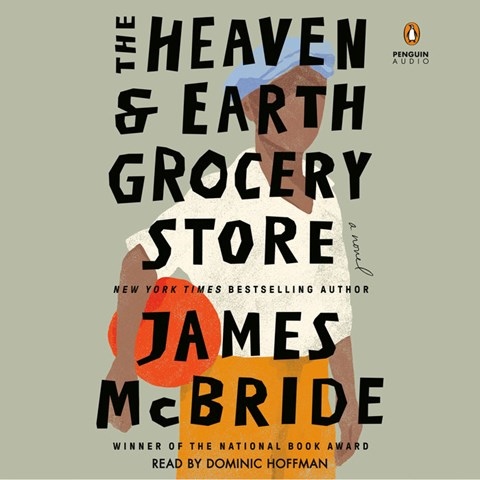 Dominic Hoffman: It saves you as a narrator, I think. It's like doing Shakespeare. If you can jump on that rhythm train, the iambic pentameter. All of a sudden, you're just riding it. They wrote it. You're just riding it, and I think that's the key to a successful reading of an audiobook from the narrator's point of view. I'm an author. I got a book coming out October 14th, 2025, Simon & Schuster. It's called LATE REHEARSALS, a bunch of short stories. But I think about somebody else recording, narrating my book, and I'm thinking, “Hey, wait a minute.” So you have to think that authors who don't do their books, who aren't actors, you still have to know that they have a tremendous investment. It’s a hard thing to write a book, and it's a very personal thing to write a book. In some ways, so much is at stake. I always tell people when they say, “What did you try to do?” I say, “I try not to mess this up, especially if it's a very, very good book.” You're like, “Okay, they don't need me to narrate this. It's there. It's in the words. It's on the page.” If you read it, it's undeniable. So if I am going to put my two cents in, it has to be more of the author's two cents than it is mine.
Dominic Hoffman: It saves you as a narrator, I think. It's like doing Shakespeare. If you can jump on that rhythm train, the iambic pentameter. All of a sudden, you're just riding it. They wrote it. You're just riding it, and I think that's the key to a successful reading of an audiobook from the narrator's point of view. I'm an author. I got a book coming out October 14th, 2025, Simon & Schuster. It's called LATE REHEARSALS, a bunch of short stories. But I think about somebody else recording, narrating my book, and I'm thinking, “Hey, wait a minute.” So you have to think that authors who don't do their books, who aren't actors, you still have to know that they have a tremendous investment. It’s a hard thing to write a book, and it's a very personal thing to write a book. In some ways, so much is at stake. I always tell people when they say, “What did you try to do?” I say, “I try not to mess this up, especially if it's a very, very good book.” You're like, “Okay, they don't need me to narrate this. It's there. It's in the words. It's on the page.” If you read it, it's undeniable. So if I am going to put my two cents in, it has to be more of the author's two cents than it is mine.
JR: It's such a balance, isn't it? Because obviously there's technique that you bring. You have training. But, at the same time, as with anything, you just have to be able to be in the moment and sort of have that as the spine as opposed to the flesh of what you're doing.
DH: Right. That's a good way to describe it: the spine. That's good. I like that.
JR: Well, I was just going to talk about Percival Everett's book that you recently narrated, JAMES. What a book that was. That was an extraordinary book. It's not a retelling of HUCKLEBERRY FINN. It's that story from the perspective of Jim, and I read the book, I listened to the narration. As I did with THE HEAVEN AND EARTH GROCERY STORE, and was just blown away by both.
DH: Oh, wow. Wow.
JR: I love listening, and I love reading. I love doing both, yeah.
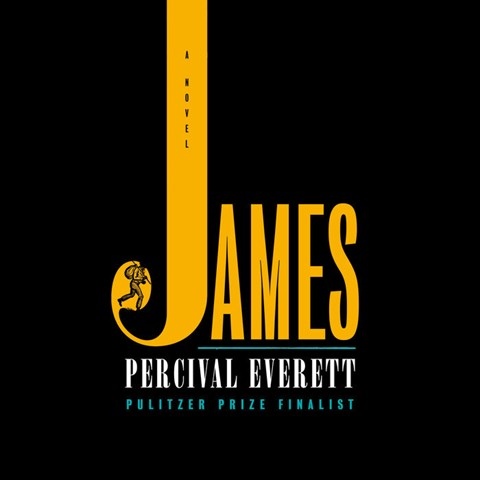
DH: Well, but that's very interesting to me because to do both because you have a different perspective on each one, I think.
JR: Yeah, because in one, the voices are in my head and then it's your voice.
DH: Which did you do first? Did you read it first?
JR: Yeah, I read it first, and believe me, your Machito was so much better than mine, let me tell you! I'd love to have you talk about perhaps some of the challenges that JAMES might have posed for you as a narrator.
DH: Well, the initial challenge was—I'm still famous in my American literature class, because I really didn't like HUCKLEBERRY FINN. I didn't like Jim. I didn't think that Mark Twain knew anything about Black people. Not to take anything away from him because I'm a big fan of his still. But for me, I was like, no, no. Talk about an unfinished story on his part. So first when they asked me this, they described it as it's HUCKLEBERRY FINN told by Jim’s perspective. I'm a little weary of slavery tales and things like that. I mean, yeah, let's talk about something else now for a second. Let's show some nuance, and then I read it, and I thought, “Okay, this is a different perspective. This is really interesting.” I sort of fought it as I was reading it the first time because it was still “Who wants to relive that?” I know it's there. It's always there. It's always going to be there for me. So, a lot of times what you're trying to do is negotiate a different path. But once I bought in, I said, Okay, this is a good tale. Yeah, this is a good story. This is life. This is a little comeback. Not vengeance but a little bit of a reconciliation with a bit of profit. Human profit, where things get better because they should have been better. It's an experience. It was an experience reading that book simply to flip the tables. The fact that they had the code. You talk to massa’ like this, “How you been? Yeah, I'll be right over there, sir.” Then you turn around and you talk to your boys like, “Okay, so we got to do something about this.” It's just crazy, beautiful. And it's true. It's true today. I'll be with some brothers. “Hey, what's up, man? How you doing?” and then somebody else in another situation, I say, “Yes, sir. What do you think about that?” They call it code switching. But, really, it's accommodating different cultures, and there are many cultures.
JR: It was such a knife to the heart when James is giving the children “language lessons,” how to talk to white people in a way that hides the kids’ own intelligence and keeps them safe. It’s slightly exaggerated, but only slightly. You could really see those lessons being imparted.
 Well let me ask you this, with JAMES, which has pretty brutal moments, and in other books you’ve narrated, like HOMEGOING, for which you won an Audie Award—another extraordinary performance. And the story is about many things but oppression and suffering are certainly intrinsic to it. How challenging is that for you as a narrator? Yes, you're an actor, and actors need to do these things. But it's so hard to listen to. I can't imagine what it's like to say the words out loud.
Well let me ask you this, with JAMES, which has pretty brutal moments, and in other books you’ve narrated, like HOMEGOING, for which you won an Audie Award—another extraordinary performance. And the story is about many things but oppression and suffering are certainly intrinsic to it. How challenging is that for you as a narrator? Yes, you're an actor, and actors need to do these things. But it's so hard to listen to. I can't imagine what it's like to say the words out loud.
DH: Well, there are often tears in the booth. There are a bunch of directors who have cried with me. I tell you, I've read a few books on Rwanda, with the war between the Tutsis and Hutsis. It's so hard sometimes, because you can't reconcile it, and it happened. You can't change it. So you're sitting there telling this story. It’s very difficult. It's very difficult, some of that stuff, but you also have this obligation to tell this truth. It's a difficult truth, and that sort of saves the narrator, because you're allowed to live in this world without sacrificing. You're just telling the story. You're experiencing it, not even secondhand, not even thirdhand. You're saying what happened, and as you're describing what happened, you're affected by it. But it didn't happen to you. So you're allowed to expound on it. It's sort of a gift, in some ways, to be able to tell this very special, precious, very sad story, and, hopefully, maybe something will change, because someone heard it.
JR: Pacing is really important to the audio experience, in all books maybe especially in a book like HOMEGOING. that goes through generations of people in Africa and the United States. How do you work out pacing?
DH: Well, you hope that the author's done that. There are a lot of people who don't really write with pace, and those are easier, in some ways, because, “Okay, then I'll give you the pace.” That's good, because you're not circumscribed by something there. In dialogue, it's much easier. Because we all speak to each other. We all have the same sort of—if you get mad at me, sometimes you either slow down, or you speed up, and then you get the choice to do either one. But if it's not dialogue, if it's just prose, and it's just going, and you're describing stuff, then you add to it how you think it should go. How fast should this be? What's going on here, and what's the best way to communicate that? You have to do that in the moment, because you get paid per finished hour, not per hour. So, yeah, you're paid to be efficacious.
JR: I think the narrative voice is so difficult, or challenging. I think that's probably the better word, and also the most difficult to explain to people who really don't listen to audiobooks very much, or who aren't in the business. That, yeah, there are the characters, but then there's this separate narrative voice, that no matter what else is going on, that voice has got to be driving the story forward.
DH: And it's got to be the same.
JR: And it's got to be the same.
DH: It's got to be consistent. There's lots of times you're going back on it because you think, “Oh, I was doing these characters and they bled into the narrator. So, whoops! I have to do it again. Sorry. Got to do it again.” Then, like you said, when you're doing three characters talking to each other in THE HEAVEN AND EARTH GROCERY STORE, you have to, okay, sort of reconfigure your brain because, okay, the Cuban guy can't sound anything like the guy from Ukraine who's Jewish. The guy from Ukraine who's Jewish can't sound anything like the guy from Arkansas who lives in Pottstown now. You know? After a while, a few hours in the studio, you sort of snap into it. You're just like, “Okay. Oh, yeah. Nope.” Boom. Boom. Boom. I guess. I mean, in some ways, I'm talking a lot of rot because it all changes as soon as you get in the chair and the lights go on and the microphone goes on and you're like, “Okay, now really what's going on?” and you're captive to the book, period.
--
Dominic Hoffman photo by Dan Reichert.
AudioFile Magazine is your #1 source for audiobook reviews.


